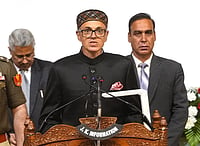This article is not about the content of Wendy Doniger’s book, The Hindus: An Alternative History. That debate, I am sure, will happen. This article is about the larger context within which, Penguin, the publisher of the book, decided to call it a day and reach an agreement with the little known Siksha Bachao Samiti which had found the book offensive to Hindu religious sensibilities. That Penguin has decided to pulp The Hindus should come as no surprise. Rather one must praise Penguin for fighting it out for four long years when many others surrendered meekly or were more than happy to oblige the government of the day.
The ‘Pulping’ Of Thought
That Penguin has decided to pulp Wendy Doniger's The Hindus should come as no surprise...

This was waiting to happen. The signs were ominously clear. Remember James Laine’s book on Shivaji and its aftermath when the Sambhaji Brigade hoodlums decided that it reflected badly on their Maratha icon. Or consider the cowardly capitulation of the Symbiosis institute in cancelling the screening of Jashn- e-Azadi, again due to pressures from right wing Hindu groups. Consider again, the VC of Madras University succumbing to threats from a lunatic Muslim fringe and not letting Amina Wadud speak on the campus. In each of these cases, the method has been similar: religious or nationalist groups have approached the state that their ‘feelings’ are hurt, the state through the police or the courts has tried to convince institutions and individuals not to create a ‘law and order’ problem and the institutions have more than obliged. More than being a ‘republic of hurt’, we are in this present mess because the state has abdicated its responsibility to protect freedom and dissent.
In the neo-liberal dispensation, the state has taken a managerial turn. It is no longer interested in ideological positioning towards the creation and inculcation of a modern citizenry. Rather, it has become post ideological in the sense that it is only interested in the management of a problem. In this kind of a resolution, ' community sentiments', no matter how dumb they may be, become the defining resolution. There is no creative engagement with the problem, but only postponing of the problem through an appeasement of the worst possible kind. The state has not withered away, but consciously abdicated itself, leaving matters of democracy and dissent to de dealt and debated by communities. In our case, religious communities are hardly amenable to a rational debate. Spokespersons of gods, they appropriate for themselves what is good or bad for their respective communities; they define the boundaries of free speech and limits of tolerance. If critique is central to modernity, then our principal critique should be directed towards religion. But the more important question to ask is whether one can do it in a context where the state is arraigned against the critic. We are perhaps looking into a bleak future: a future without criticality, engaged writing, meaningful publishing, ability to talk and think. Some have called this state of affairs as fascism.
What is equally problematic is the academic credibility that this managerial turn of the state gets through fashionable terms like multiculturalism. Acceptance of different faith communities must be promoted, but it should not preclude the right to criticise what one finds retrograde or purely abhorrent in a particular religious or cultural tradition. In the name of promoting and practising multiculturalism, there has emerged a culture of silence around issues which need to be critiqued and roundly condemned. Tolerance (which is itself a problematic word) of different cultural traditions should not mean tolerance of anti- women, anti- gay attitudes present within different cultures. Added to this is also the managerial turn of some activists who claim to have created alternative spaces for articulating dissent, freedom and resistance. Before we knew that Tarun Tejpal was more interested in profits (of different kinds) rather than in making us think through his ‘thinkfest’, there was the Jaipur literary festival. The meek abject surrender by the organisers which we witnessed when Salman Rushdie was not allowed to speak at the festival speaks volumes about their politics and conviction. One is tempted to ask the need for this alternative space when it cannot speak out against religious bigotry.
Freedoms of thought, freedom to hear and be heard are values which must be defended if India is to become a better democracy. And where religious communities are concerned, freedom to critique, provoke and even offend should be understood as an inalienable part of freedom of expression.
Arshad Alam is with Center for the Study of Social Systems, Jawaharlal Nehru University





















